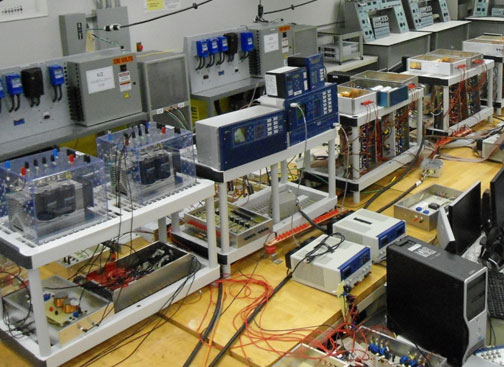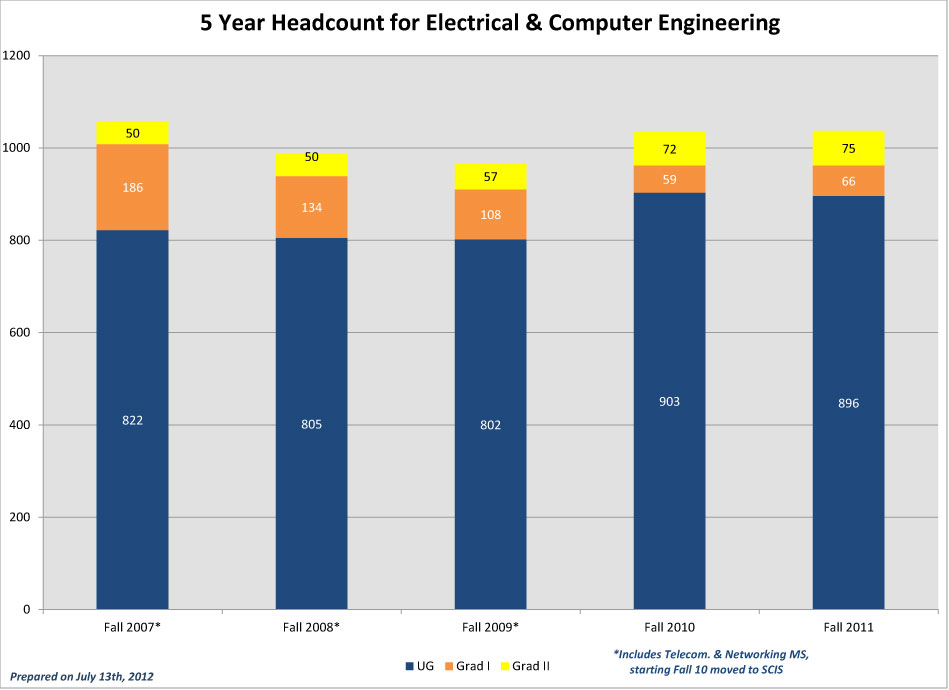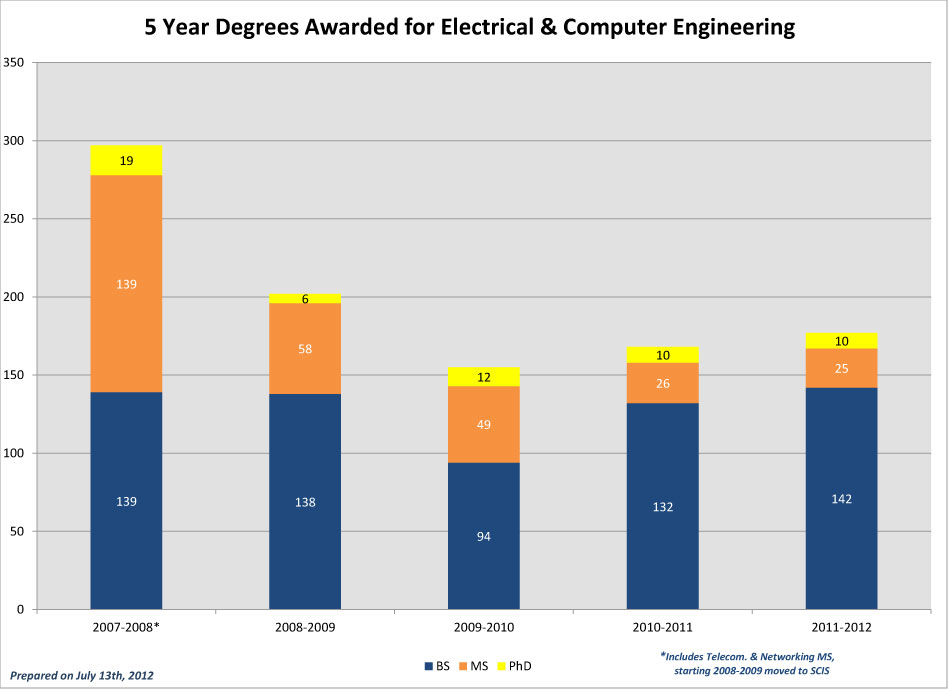2011-2012 Annual Report

Department Overview
In 2011-2012, the Department of Electrical and Computer Engineering (ECE) continued its growth and accomplishments. The faculty continues to be involved in a balanced combination of research and teaching so as to fully benefit the students. A large number of our faculty has considerable industrial experience and some maintain active consulting roles to provide current and relevant knowledge to the students in classroom and research settings. The ECE Department continues to improve the quality of the undergraduate program by reviewing and updating the curriculums for both the EE and CpE programs to attract more high school graduates and transfer students. Our vision remains the same: to have the best undergraduate program in the State of Florida and to be internationally recognized with our graduate program driven by excellent research that responds to the needs of the State of Florida, in particular, and the nation in general. Furthermore, serving our community and maintaining our mission in providing excellence in undergraduate education so that our graduates become critical thinkers, creative problem solvers and lifelong learners. This annual report provides a summary of the critical data for our department in the areas of academics, research, training, and future plans and priorities for the period of May 2011 to April 2012. We are proud of our accomplishments, and look forward to yet another year of growth and success.
Department Highlights
In fall 2011 Prof. Kang Yen, after 10 years of service to the department as Chair, was recruited to serve as Director of External Program Development in the College of Engineering and Computing.
Dr. Shekhar Bhansali, a prolific researcher joined FIU and the Department of Electrical and Computer Engineering as the Alcatel-Lucent Professor and Chairman. Dr. Bhansali has 16 U.S. Patents, more than 85 published journal papers and 100 conference papers in addition to editing two books and five book chapters.
The department continued to progress towards its goal of being a flagship research program in the state of Florida throw recruitment of excellent scholars to teach and train its students and lead new research. The department hired five new faculty for a fall 2012 start. The faculty members are Prof. Mercedes Cabrerizo, Prof. Irene Calizo (joint appointment with MME), Prof. Arif Islam, Prof. Ismael Guvenc and Prof. Shaolei Ren (joint appointment with SCIS).
The department created its Academic Accreditation Advisory Board. Memberships of the board are for renewable 2 year terms.
The department revised and streamlined its graduate curriculum for Masters and Doctoral programs to ensure that students have both the breadth and depth. The department initiated its review of undergraduate curriculum in an endeavor to develop a program more responsive to the needs of the stake holders.
Responding to the market needs, the department created the IT academy in collaboration with division of external programs. The IT academy will offer training for certifications that are required by the industry for its employees.
The department entered into a collaborative partnership with Motorola to develop a state of the art RF and Microwave Lab.
The ECE faculty continued to be invited to lecture, provide plenary presentations in the U.S. and international conferences and serve as editors in major journals either as a guest editor, associate editor or members of the editorial board.
Faculty and Research Highlights
The department’s research efforts continue to be funded through major governmental, institutional and corporate sponsors such as the National Science Foundation, the US Department of Defense, the Office of Naval Research, the US Air Force, the National Security Agency, the Department of Education, the Army Research Lab, Miami Dade County Public Schools, Florida State University, amongst others.
Prof. Grover Larkins’ group’s work on Indications of superconductivity in Doped Highly Oriented Pyrolytic-Graphite was selected for inclusion in the highlights of 2011 by the editors of superconductor Science and Technology.
Prof. Sakhrat Khizroev developed an industry university consortium to focus on next generation energy-efficient information processing. Prof. Khizroev led the consortium’s bid to create an NERC.
Prof. Shekhar Bhansali co-directed the NCSU led NERC bid in the area of biomedical, environmental sensors and biomedical informatics.
Professor Faisal Kaleem continues to be an ambassador for both ECE and FIU through repeated appearances on TV to talk about current issues that involve technology and security.
Dr. Hai Deng recently received two research contracts in multiple-input multiple-output (MIMO) radar signal processing and inverse synthetic aperture radar (ISAR) design funded by Air Force Research Lab (AFRL) via MacAulay-Brown, Inc., and NASA, respectively. He also participated in two research projects in RFID and wireless sensor networks as a Co-PI funded by Miami-Dade Transit (MDT) and Florida Department of Transportation.
Dr. Armando Barreto continued to lead the “Human-Computer Interaction for Universal Access” thrust of the FIU NSF CREST Center, a collaborative endeavor between ECE and SCIS, directed by Dr. Naphtali Rishe. Dr. Barreto is also collaborating in the development of Human-Computer Interaction aspects of the project “Development of an Instrument for Information Science and Computing in Neuroscience“, led by Dr. Malek Adjouadi. In 2011-2012 Dr. Barreto initiated a new research project in collaboration with industry for the processing of signals from miniature inertial sensors placed on a virtual reality glove.
Dr. Nezih Pala has been continuing his research on THz technologies and application along with nanoscale materials and devices at his Integrated Nanosystems Research Lab (INSYST). THz plasmonic device research supported by NSF CAREER award resulted development of plasmonic lenses for THz radiation control and detection. His collaboration with Qatar University and Korea Advanced Institute of Science and Technology (KAIST) allowed exploration of THz-methane hydrate interactions potentially could lead efficient methane extraction from natural deposits and methane storage.
Dr. Gang Quan is the single PI for two NSF grants (including an NSF Faculty Early Career Award) with total NSF funding of $650,000 to develop advanced power/energy efficient and thermal aware techniques in design of advanced real-time computing systems. He is also the single PI at FIU in a collaborated NSF project (with Dr. Shangping Ren from the Institute of Illinois Technology) with total NSF funding of $500,000 (FIU share of $201,000) to develop virtualization technology at the architecture level for multi-core computing system design. Dr. Gang Quan also leads an NSF Course, Curriculum, and Laboratory Improvement (CCLI) project (with Professor John Bowles from the University of South Carolina) with total NSF funding of $150,000 in the development of novel course materials for undergraduate graduate education on embedded system design. He also severs as the PI for two NSF REU projects with total NSF fund of $32,000.
Prof. Jeffrey Fan continued to lead the efforts of improving VLSI Lab in the research thrust of computer system design with industrial partners, Mentor Graphics and MOSIS foundry. The three-year project entitled “Fabless IC Design House – from concept to prototype“, funded by FIU Technology Fee and when completed, will be the first in Southern Florida that provides fabrication of real IC chips from design concept to prototypes for FIU students, researchers, and alumni. Current applications include the design and prototyping of spiking neural networks in mixed-signal IC chips to control prosthetic arms – a project sponsored by NIH.
Student Highlights
The ECE Department encourages undergraduate and graduate students to participate in internship training. Consequently the students have been offered internships by various companies locally in the United States and the world. The department also encourages students to present papers, attend conferences and collaborate in research activities with other Universities. This year a team of senior design students had the honor of showcasing their project titled “Miami Sky-I” at the Smithsonian National Air and Space Museum in Washington, D.C.
Job opportunities for students continue to be offered to our graduates by government agencies and the industry including Intel Corp., Qualcomm and Southwest Research Institute® (SWRI®).
Dr. Mahmoud M. Amin, who recently received his doctoral degree from ECE Department at FIU, was hired and a post doctoral research fellow at the energy systems research laboratory. He is involved in research related to power systems and power electronics applications including plug-in hybrid electric vehicles and smart grid. Dr. Amin was the recipient of Dissertation Year Fellowship Award from the University Graduate School. As a doctoral student at FIU, Mahmoud received the IEEE PES Award for Student Technical Paper Contest. Dr. Amin published 4 journal articles and more than 15 conference articles in the years leading to the doctoral degree.
Mr. Vahid Salehi, a Ph.D. candidate at the Energy Systems Research Laboratory was the first place winner in the FIU Scholarly Forum. Mr. Salehi is also the recipient of the 2012 DEA Fellowship from FIU. Vahid has recently published three journal articles in the IEEE Transitions on Smart Grid.
Mr. Ahmed Mohamed, a Ph.D. candidate at the Energy Systems Research Laboratory, has received the DEA Fellowship from FIU and has received several travel awards to present his papers at conferences. Mr. Ahmed has published 5 journal articles in various IEEE transactions in addition to more than 15 conference publications.
Mr. Ali Sarikhani, a Ph.D. candidate at energy systems research laboratory, is a recipient of Dissertation Year Fellowship Award from the University Graduate School. He also received several travel awards to conferences. Mr. Ali Sarikhani has published 5 journal articles in the IEEE Transactions on Energy Conversion and the IEEE Transactions on Magnetics.
Mr. Arash Nejadpak, a Ph.D. candidate at energy systems research laboratory, is a recipient of Dissertation Year Fellowship Award from the University Graduate School. He also received several travel awards to conferences. He is the second place award winner in Graduate school scholarly forum prize for outstanding paper award. Arash has already published 3 journal articles and more than 10 conference articles
Mr. Mohammadreza Barzegaranbaboli, a Ph.D. candidate at energy systems research laboratory, has received several travel awards to conferences and has published 4 journal articles and more than 10 conference articles.
Mr. Ali Mazloomzadeh, a Ph.D. candidate at the Energy Systems Research Laboratory, has received travel awards to present his work at national and International Conferences. He has published two journal articles in IEEE transactions in addition to several conference papers.
Dr. H. Huang, a recent Ph.D. graduate from the Advanced Real-Time Computing System Lab, has published a number of research papers at the well-known and top-tier conferences in the area of electronic design automation including the IEEE/ACM Design Automation Conference (DAC), the IEEE/ACM Design Automation & Test in Europe Conference & Exhibition (DATE), and IEEE Asia and South Pacific Design Automation Conference (ASP-DAC). He was also invited to attend the Ph.D. forum at DAC’2011 and DATE’2011. Dr. Huang was also received the travel grants to present his work at DAC’2011.
Mr. S. Liu, a Ph.D. candidate from the Advanced Real-Time Computing System Lab, has received the travel award to present his work at the IEEE International Conference on Services Computing, a premier conference on service oriented computing held in Washington DC.
During year 2011-2012, there are total of ten undergraduate students (A. Chong, C. Lopez, J. Perez, M. Robinson, I. Champon, C. Bracesco, Y. Ding, Z. Wang, I. Logvyn, A. Iaizzo), funded by NSF REU program, joined The Advanced Real-time and Computing System lab (ARCS-lab) led by Dr. Quan to participate a variety of different research projects from software simulations to Android software development.
Dr. Charles Castello, received his Ph.D. degree in EE in August 2011 plus MS and BS degrees in computer engineering at FIU, has immediately landed a position at the Oak Ridge National Lab in the U.S. Department of Energy. He has co-authored a book, entitled “Microelectronic Sensors for Environmental Monitoring“, with his major advisor, Dr. Jeffrey Fan, in May 2011. In addition, he has published four journals and seven conference papers during his doctoral study at FIU.
New Infrastructure
The Energy Systems Research Laboratory directed by Professor Mohammed features a smart grid Test-bed Laboratory with, fully functional Smart Power System including sustainable energy micro grids. The test-bed supports educational, training and research initiatives. The Test-bed includes commercial Synchrophasor measurement devices to enable wide area monitoring, protection and distributed control of power to the various loads on the AC side and/or the DC micro grid side. The test-bed is capable of connecting wind farm emulators, photovoltaic emulators and energy storage. All assets connected to the Test-bed are controlled by a human machine interface as an energy control center developed by our research and enable the utilization of commercial software for analysis used in industry. A communication layer is also implemented to measure and utilize the power dynamically and enable the study of energy transfer among interconnected areas, power sharing and dynamic control to avoid unscheduled outages.
Dr. Pala has received FIU TechFee grant to develop graduate and undergraduate lab courses on nanofabrication techniques. The 3-year grant allowed enhancement of nanofabrication infrastructure by acquisition of several state of the art tools as well as improvement of the existing ones.
Fall Term Enrollment

Degrees Awarded

Sponsored Research Awards ($Millions)

